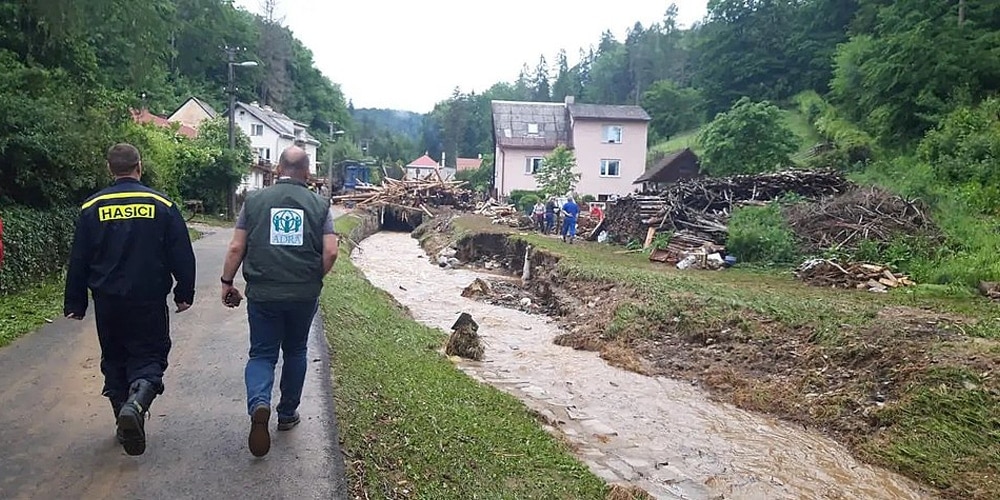
The Adventist Development and Relief Agency (ADRA)’s stated goal of serving humanity so all may live as God intended was put to the test in the Czech Republic during 2020, regional leaders recently reported. In a difficult year, ADRA Czech Republic managed to meet challenges and assist those going through various ordeals, they said.
“We are grateful to our donors, sponsors, and all the willing people who supported us in various ways during the turbulent year of 2020,” Radomír Špinka, ADRA Czech Republic’s country director, said. “[They] enabled us to help tens of thousands of people affected by natural and war disasters around the world and in emergencies in our country. By far, the biggest challenge for us was to organize help during the COVID-19 pandemic,” he added.
Every year, ADRA Czech Republic involves more than 3,000 volunteers who regularly visit various health and social institutions, providing support to those who need it. They visit the elderly and sick people in hospitals for the mentally ill or children in orphanages. ADRA Czech Republic manages 15 volunteer centers spread all over the country.
As the Pandemic Hit
At the beginning of the pandemic, a primary need was to provide personal protective equipment (PPE) and purchase and deliver food and medicine for vulnerable groups, especially the elderly and the chronically ill. Thus, in the first months of the pandemic, ADRA volunteers distributed more than 2,000 purchases and more than 40,000 face masks.
In the second wave of the coronavirus crisis, the biggest problem turned out to be the lack of staff in social and medical facilities. Volunteers then began to help caregivers by spending time with clients, involving them in rehabilitation exercises, and assisting support staff in kitchens or laundries. Most volunteers worked in the Moravian-Silesian Region, where the local volunteer centers established cooperation with the region's management and several companies. As part of this initiative, ADRA trained about 100 new volunteers, who assisted in more than thirty facilities across the region.
In the South Bohemian Region, ADRA joined forces with other organizations such as Caritas, Diakonie, and the Czech Red Cross. Volunteers helped ensure the operation of a temporary facility for social services clients after they were discharged from the hospital or for people who were under quarantine. They also helped them with purchases and other necessary matters.
In Příbram, volunteers also helped with tutoring children, and in Brno, they sent greetings to seniors and helped them learn how to use tablets.
Another group that ADRA volunteers tried to help was people who found themselves isolated or lonely because of the pandemic. Volunteers contacted people in need over the phone or the internet and helped them navigate challenging situations.
In several places, ADRA also organized concerts held outside the windows of social and medical facilities, in which local music associations and bands participated. "Cheerful tones of live music lit up the eyes of seniors and nursing staff in Klatovy, Znojmo, and Brno,” Špinka reported.
Facing Other Emergencies
Before the pandemic, ADRA Czech Republic had been assisting people affected by emergencies for a long time. The agency's help has historically included material, financial, and volunteer help, but also psychological support and company after tragic events.
An essential part of the emergency department is putting psychological support teams together to assist people affected by a tragic event.
In addition to helping after emergencies, ADRA is intensively involved in the training and education of new volunteers. “We focus on the topics of psychological first aid, telephone support, data collection in the field, and even operation of small equipment like generators, dryers, and so on,” Špinka explained.
In June 2020, ADRA helped after the flash floods around Litovel and, in cooperation with the ČEZ Foundation and People in Need, managed to clean more than 200 flooded wells in Šumvald, which are the only source of drinking water for the locals.
“For us, 2020 was a year of new challenges due to the pandemic, as well as a year of a number of local emergencies that we could not miss,” Špinka said. “We are truly grateful to God and all our supporters, employees, and church leaders for their commitment, willingness to serve, and desire to spread the notion of selfless help to others in good or bad times.”
The original version of this story was posted on the Inter-European Division news site.